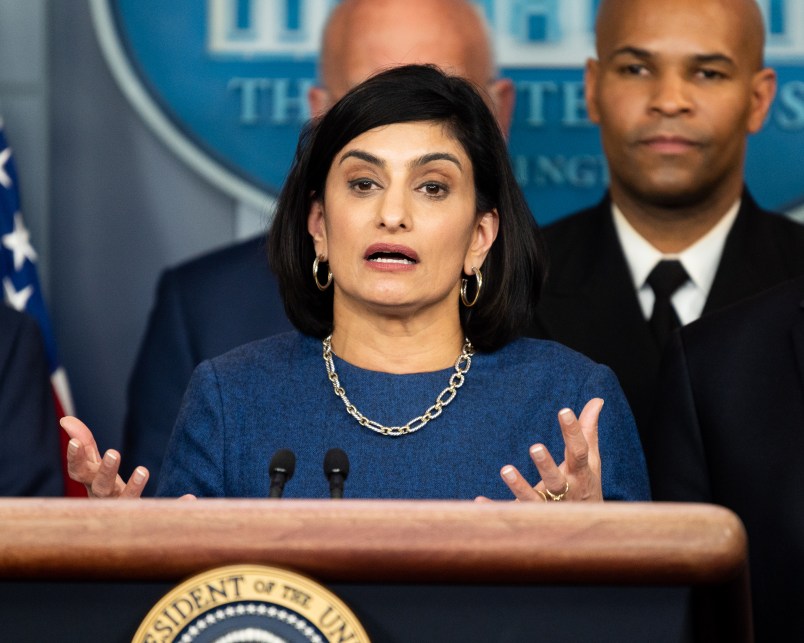Over and over again Thursday night, the Trump administration official in charge of Medicare and Medicaid refused to say whether she was confident the U.S. health care system could handle the COVID-19 outbreak.
Instead Seema Verma, the administrator of the Centers for Medicare and Medicaid Services and a member of the White House Coronavirus Task Force, dipped and dodged basic questions and instead opted for all-purpose praise of the President’s “bold and decisive action.”
In fact, when Fox News’ Martha MacCallum first asked Verma whether hospitals would have enough space and equipment to deal with the pandemic — intensive care facilities, ventilators, swabs, testing equipment — Verma pointed to the Trump administration’s bungled response in Puerto Rico, after Hurricane Maria.
“How concerned are you that when these numbers do start to rise, which Dr. [Anthony] Fauci has told us to expect, that they’ll be enough ICU units, enough ventilators to help the people that do get sick in this country?” MacCallum asked.
“Well, that’s why we have an emergency-prepared system. We’re used to dealing with disasters,” Veema responded. “If we look at some of the disasters that have happened around hurricanes in Puerto Rico and Florida, there is a system in place to make sure that folks that are on the front lines have the equipment and supplies that they need.”
MacCallum pressed on: “So you’re saying we do have enough?”
But Verma ignored her, talking about how the administration was having “rapid dialogue with health care providers,” and meeting with them “almost” on a daily basis.
MacCallum tried again to ask the same question, but Verma kept talking, encouraging Americans to call their doctors if they feel unwell.
MacCallum tried asking yet again: “Are there going to be people in this country who don’t get a ventilator if they need one? Are you concerned that the actual physical equipment that is needed to serve the people who will get sick is out there? Can you reassure everyone tonight that there is not a shortage of ventilators or ICU units?”
Verma responded by praising the President.
“And that’s why the President has taken such a bold and decisive action, right?” she said. “We’re not waiting for this to get worse. We’re not waiting for this to be a crisis in our health care systems.”
“That’s why the mitigation strategies that he announced last night — limiting travel from Europe, not allowing that, we’ve given travel advisories on cruise ships — that’s why we’re taking all of this action, because we don’t want to put stress on the health case system.”
It was not a direct answer to the question, MacCallum observed. “But it sounds like a hope that there won’t be enough sick people, and we won’t run out of ventilators because we have mitigated, and we certainly hope that’s the case,” the Fox News host added.
In reality, public health officials (and former President Barack Obama, on Thursday) point out the very real threat COVID-19 poses of over-taxing the U.S. health care system. It’s why some have attempted to popularize the phrase “flatten the curve,” a reference to the graphical representation of COVID-19 cases over time.
When the curve of these cases is flattened, so to speak — that is, when transmission rates are lowered due to the cancellation of large events and urging sick people to quarantine at home — it means the U.S. hospital system is dealing with fewer cases at once, and is therefore less likely to run out of hospital beds, ventilators and other resources.
Watch below:
.@marthamaccallum: "Are there going to be people in this country who don't get a ventilator if they need one?" @SeemaCMS: "And that's why the president has taken such a bold and decisive action, right? We're not waiting for this to get worse…" pic.twitter.com/JcEDs726IB
— Matt Shuham (@mattshuham) March 13, 2020



